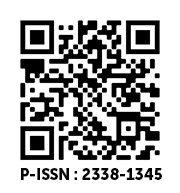The consumer purchase motivation of Organic Food in Online Retail
DOI:
https://doi.org/10.36782/apjsafe.v12i1.333Keywords:
consumer motivation, online retailing, organic foodAbstract
Organic food relies on consumer confidence as the driver of its buying process. Generally, consumers purchase it directly to ensure its organic guarantee. The increasing purchase of agricultural products and organic food online in Indonesia shows consumer confidence in organic products sold in e-commerce. These studies aimed to determine the driving factors of purchasing organic food through online retailing, the types of organic food purchased, and the relationship between consumer motivation and purchasing decisions. This study uses a cross-sectional method with a purposive sampling technique, and the data is processed using SPSS with General Linear Model analysis. The results from 102 respondents in Indonesia showed that convenience, practicality, and time efficiency as the biggest motivation of consumers (85.30%). On the other hand, pleasure is the slightest consumer motivation (1.0%). Vegetables and processed seeds/nuts are widely purchased as fresh and processed organic foods. The relationship between consumer motivation and online purchasing decisions is that both variables affect one another. The consumer motivation driving factors are diverse product variants, attractive packaging, organic labels, nutritional value, discounts, time efficiency in purchasing, easy-to-find online stores, and advertising. Affordable prices do not motivate consumers to purchase organic food online. Therefore, organic food consumers in Indonesia purchase products through online retailing for convenience.
Downloads
References
Alamsyah, D. 2016. Kepercayaan konsumen pada produk organik. Ecodemica, IV (2): 148-150.
Aliansi Organik Indonesia. 2019. Statistik Pertanian organik Indonesia. AOI, Bogor
Annunziata, A. and Vecchio, R. 2016. Organic farming and sustainability in food choices: an analysis of consumer preference in Southern Italy. Agriculture and Agricultural Procedia, 8: 193-200.
David, W. and Ardiansyah. 2017. Organic agriculture in Indonesia: Challenges and opportunities. Organic Agriculture 7: 329-338.
FiBL dan IFOAM. 2021. The world of organic agriculture, statistics & emerging trends 2021(https://www.fibl.org/fileadmin/documents/shop/1150-organic-world-2021.pdf) accessed 28 April 2021).
Husaini, M. 2020. Hubungan tingkat pendidikan dan persepsi konsumen tentang kualitas dan manfaat beras organik di kota Baratai. Tesis, Universitas Islam Kalimantan MAB.
Ibitoye, O.O., Nawi, N.M., Kamarulzaman, N.H., and Man, N. 2014. Consumers’ awareness towards organic rice in Malaysia. International Food Research Journal 21(5): 1711-1718.
Kastenholz, C. 2021. Gen Z And The Rise Of Social Commerce. [online]. https://www.forbes.com/sites/forbesagencycouncil/2021/05/17/gen-z-and-the-rise-of-social-commerce/?sh=7e3093ea251d accessed 23 October 2021.
Katadata. 2021. Pilihan Media Sosial Berdasarkan Asal Generasi-GlobalWebIndex [online]. https://databoks.katadata.co.id/datapublish/2021/05/16/instagram- media-sosial-favorit-generasi-z accessed 23 October 2021.
Kranjac, M., Vapa-Tankosić, J., and Knežević, M. 2017. Profile of organic food consumers. Economics of Agriculture 2: 504-506.
Lassoued, R. and Hobbs, J.E. 2015. Consumer confidence in credence attributes: The role of brand trust. Food Policy 52: 99-107.
Malik, M.E., Ghafoor, M.M., Iqbal, H.K., Ali, Q., Hunbal, H., Noman, M., and Ahmad, B. 2013. Impact of brand image and advertisement on consumer buying behavior. World Applied Sciences Journal 23 (1): 117-122.
Palupi, E., Jayanegara, A., Ploeger, A., and Kahl, J. 2012. Comparison of Nutritional Quality between Conventional and Organic Dairy Products: A Meta‐Analysis. Journal of the Science of Food and Agriculture: 1-8.
Rousseau, S. and Vranken, L. 2013. Green market expansion by reducing information asymmetries: Evidence for labeled organic food products. Food Policy 40: 31- 43.
Soroka, L. and Wojciechowska-Solis, J. 2019. Consumer Motivation to buy organic food depends on lifestyle. Foods 8 (581): 5-6.
Suharjo, B., Ahmady, M., and Ahmady, M.R. 2016. Indonesian Consumers’ Attitudes towards Organic Products. Advances in Economics and Business 4 (3): 132-140.
Thio, S. 2008. Persepsi konsumen terhadap makanan organik di Surabaya. Jurnal Manajemen Perhotelan, 4 (1): 18-27.
Tung, S., Shih, C., Wei, S. and Chen, Y. (2012), Attitudinal inconsistency toward organic food in relation to purchasing intention and behavior: An illustration of Taiwan consumers. British Food Journal, 114 (7): 997-1015.
Waskito, D., Ananto, M., and Rezza, A. 2014. Persepsi konsumen terhadap makanan organik di Yogyakarta. Pelita IX (1): 37.








